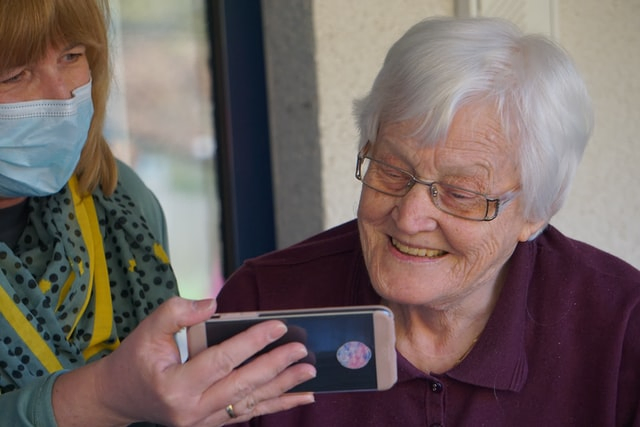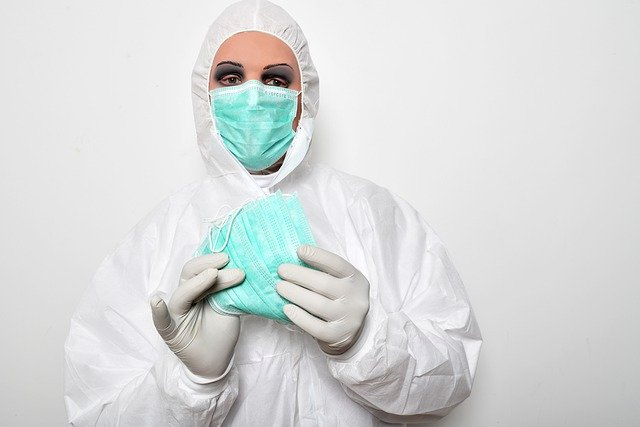Covid-19 Through the Lens of a Triage Nurse

As the unprecedented Covid-19 pandemic wears on, patients and families on Unity’s hospice and palliative services have undoubtedly been facing increased challenges. It is easy to see how isolated many of our patients and families must feel at times. Typically, perspectives and stories from the hospice and palliative care fields are not highlighted in the mainstream media and it is therefore, not starkly obvious to the public how much strain trickles down to our patient population. My role as a triage nurse at Unity has given me the unique opportunity to hear and understand how the Covid-19 pandemic has been affecting our patients and their families on a daily basis. The frustration and the sadness of the whole situation are truly palpable and difficult to process at times.

We serve patients who only have the option to visit family members through a window or on a video screen.
Photo by Georg Arthur Pflueger on Unsplash
I’d like to take the time to share some perspectives from my corner of the health care world with the hope that it may help our patients and families feel less alone as they continue to navigate these difficult situations. These are some of the many observations I have made over the last four months that have made life very challenging for Unity patients and families:
- We serve patients who have had to cancel special, once in a lifetime or bucket list plans and vacations.
- We serve patients in facilities who are not allowed to leave their rooms or their buildings or participate in group meals or activities.
- We serve patients who live in facilities that limit or restrict family and friends from visiting in order to prevent outbreaks and spread of disease.
- We serve patients who only have the option to visit family members through a window or on a video screen.
- We serve patients who already struggled with social isolation prior to Covid-19 who now have even fewer visitors and supports available to them.
- We serve patients who have lost their hired caregivers and other support systems in the home due to exposure or risk of exposure.
- We serve patients with visual and hearing impairments who can’t see or hear well enough to participate in phone calls or video chats.
- We serve patients with caregivers who are forced to navigate hospice care without the additional help and support of willing friends or family because they cannot visit or travel.
- We serve patients who are being cared for by caregivers and family members who are now also juggling working and/or schooling from home.
- We serve patients who are nervous to let our staff visit them in their homes even though they need our help and support.
- We serve patients with dementia and end-of-life delirium who become even more confused or fearful seeing staff dressed in masks and other personal protective equipment.
- We serve patients in some facilities who cannot allow our CNAs to provide a weekly 1:1 bath or shower, which for some, is the most personal, unrushed attention they might have been receiving each week.
- We serve patients who are temporarily unable to receive visits from volunteers who previously provided pet therapy, music therapy, haircuts, Veteran’s programs, companionship, and a listening ear.
- We serve patients who can only receive visits from their chaplain and social worker over the phone or video chat in lieu of face to face support.
- We serve patients who are fearful that they will die from this virus weeks or months before their terminal illness would have taken them.
- We serve families who are not able to be at the death of their loved ones.
- We serve families who cannot hold funerals or celebration of life ceremonies now or in the near future.
- We serve families who cannot gather together to support one another after they’ve lost a loved one.
- We serve families who cannot attend in person bereavement groups they rely on to work through their grief with others.

We serve patients with dementia and end-of-life delirium who become even more confused or fearful seeing staff dressed in masks and other personal protective equipment.
As overwhelming as it may be to read and think about the above situations, it is the reality of what our patients and families live day in and day out in this Covid-19 world. We at Unity recognize that the need for support through the end-of-life journey is more important than ever. Over the last few months, I have seen our staff and leaders and partners and volunteers rise up and respond to these ever changing challenges and situations with positive attitudes, teamwork, compassion, creative solutions, and ingenuity. I know with all of my heart that my co-workers are doing everything they can to try to ensure that patient and family needs are being met. Time and time again, I am so proud and grateful to be a part of the Unity team. Though I anticipate that the burdens and challenges of this pandemic are far from being over, I really do hope that we have been able to help patients and families feel less alone through this isolating situation.
To learn more about Unity Hospice’s services and how we are supporting the community during COVID-19, please visit here or call 1-800-990-9249.
This blog post was shared by Keri Stordeur, a Registered Nurse who is also a Certified Hospice and Palliative Nurse. Keri serves as a Triage Nurse at Unity Hospice.
If you found this information helpful, please share it with your network and community.






